Brooklyn College Professor of Anthropology Helps Describe the Earliest Primate Fossils
February 24, 2021
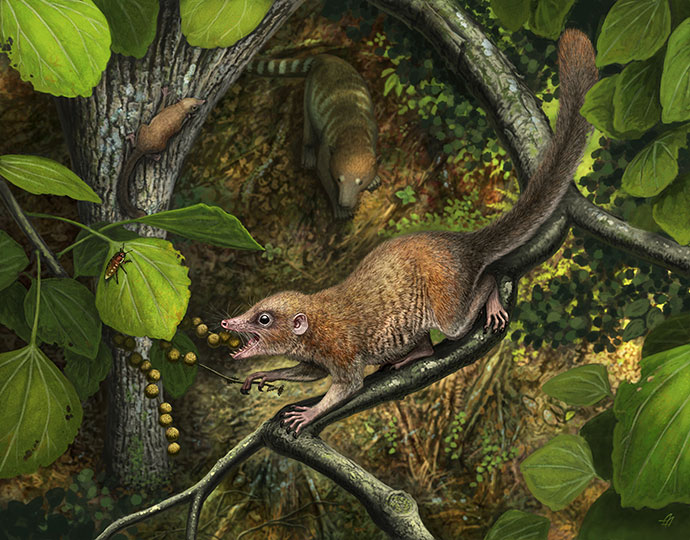
A lifelike rendering of the newly discovered early primate species Purgatorius mckeeveri. Illustration by Andrey Atuchin
Shortly after the extinction of the dinosaurs, the earliest known archaic primates, including a new species, Purgatorius mckeeveri (foreground), quickly set themselves apart from their competition (see archaic ungulate mammal on the forest floor) by specializing on an omnivorous diet including fruit found up in the trees.
First fossils of ancient, small-bodied primates provide a big glimpse into how our earliest primate relatives lived 66 million years ago after an asteroid wiped out dinosaurs.
A Brooklyn College professor was part of a discovery of the first fossil evidence of any primate, illustrating the earliest steps of primates 66 million years ago following the mass extinction that wiped out all dinosaurs and led to the rise of mammals.
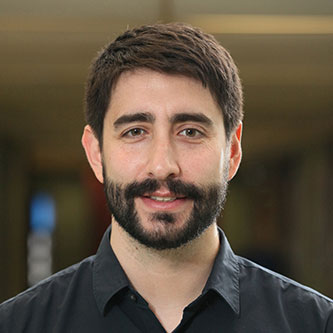
Assistant Professor Stephen Chester
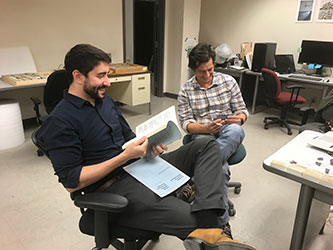
Co-authors Stephen Chester (left) and Gregory Wilson Mantilla examine Purgatorius fossils at the University of California Museum of Paleontology. Photo by Patricia Holroyd
More on this Fantastic Fossil Find
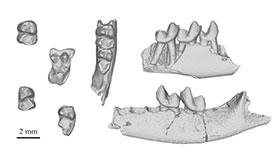
High resolution CT scans of an assortment of fossilized teeth and jaw bones of Purgatorius. Image courtesy of Gregory Wilson Mantilla and Stephen Chester
The recently uncovered fossils include two species of Purgatorius—Purgatorius janisae and a new species called Purgatorius mckeeveri. Three of the teeth found have distinct features compared to any previously known Purgatorius species and led to the description of the new species. Purgatorius mckeeveri is named after Frank McKeever, who was among the first residents of the area where the fossils were discovered, and also the family of John and Cathy McKeever, who have since supported the fieldwork where the oldest specimen of this new species was discovered.
Stephen Chester, an assistant professor of anthropology and paleontologist who teaches in Brooklyn College’s School of Natural and Behavioral Sciences and The Graduate Center, CUNY, was part of a team of 10 researchers from across the United States who analyzed several fossils of Purgatorius, the oldest genus in a group of the earliest-known primates called plesiadapiforms. These ancient mammals were small-bodied and ate specialized diets of insects and fruits that varied across species.
This discovery is central to primate ancestry and adds to our understanding of how life on land recovered after the Cretaceous–Paleogene extinction event 66 million years ago that wiped out all dinosaurs, except for birds. This study was documented in a paper published in the journal Royal Society Open Science.
“This discovery is exciting because it represents the oldest dated occurrence of archaic primates in the fossil record,” Chester said. “It adds to our understanding of how the earliest primates separated themselves from their competitors following the demise of the dinosaurs.”
Chester and Gregory Wilson Mantilla, Burke Museum Curator of Vertebrate Paleontology and University of Washington biology professor, were co-leads on this study, where the team analyzed fossilized teeth found in the Hell Creek area of northeastern Montana. The fossils, now part of the collections at the University of California Museum of Paleontology, Berkeley, are estimated to be 65.9 million years old, about 105,000 to 139,000 years after the mass extinction event.
Based on the age of the fossils, the team estimates that the ancestor of all primates (the group including plesiadapiforms and today’s primates such as lemurs, monkeys, and apes) likely emerged by the Late Cretaceous—and lived alongside large dinosaurs.
“Stephen Chester’s high-caliber impactful research in this area with Brooklyn College students has significantly contributed to our understanding of the environmental, biological, and social dependencies that ultimately led to the evolution of primates," said Peter Tolias, dean of the School of Natural and Behavioral Sciences.
This is not the first big find Chester has been involved with. While this latest discovery is unique in that it focused on one group of mammals—primates—in 2019, Chester, along with current collaborator Wilson Mantilla, was a key member of a groundbreaking discovery that revealed in striking detail how many life forms—including mammals, turtles, crocodiles, and plants—recovered after the asteroid impact that wiped out the dinosaurs. Chester, who specializes in the early evolutionary history of primates and other placental mammals, was also a co-author of that peer-reviewed scientific paper in Science magazine with Denver Museum of Nature & Science researchers.
In 2015, while at Brooklyn College, Chester was also the lead author on a paper published in the Proceedings of the National Academy of Sciences on this same genus of primate, Purgatorius. His co-authored paper described the ankle bones of Purgatorius, which is still the oldest fossil evidence that primates lived in the trees shortly after the extinction of the dinosaurs.
Chester did some of the research for this project at his Evolutionary Morphology Laboratory, where he trains undergraduate students in all aspects of paleontological research at Brooklyn College. While students were not directly involved in this latest discovery and subsequent paper, Chester has brought many lucky students from his paleoanthropological fieldwork classes to Wyoming, Montana, and North Dakota to a region essentially known as the “paleontological mecca of the West” to dig for primate fossils from 66 million years ago. These trips connected Brooklyn College students with Chester’s scientific collaborators and other students from the Denver Museum of Nature & Science, the Smithsonian’s National Museum of Natural History, the Yale Peabody Museum, the Royal Ontario Museum, and the Marmarth Research Foundation.
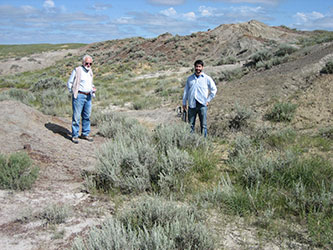
Chester (right) and William Clemens at one of the Purgatorius fossil locations in the Hell Creek area of northeastern Montana. Photo by Eric Sargis
The team of researchers who collaborated alongside Chester and Wilson Mantilla in this latest discovery includes William Clemens, University of California Museum of Paleontology; Jason Moore, University of New Mexico; Courtney Sprain, University of Florida and University of California, Berkeley; Brody Hovatter, University of Washington; William Mitchell, Minnesota IT Services; Wade Mans, University of New Mexico; Roland Mundil, Berkeley Geochronology Center; and Paul Renne, University of California, Berkeley.
Media contact: Rich Pietras:
Richard.Pietras@brooklyn.cuny.edu
About Brooklyn College
Brooklyn College is an innovative liberal arts institution with a history of more than 90 years of academic excellence. With more than 17,000 students enrolled in 175 undergraduate and graduate degree programs in the humanities; social, behavioral, and natural sciences; education; business; and the arts, the college is renowned for its rigorous academics, diverse student body, award-winning faculty, and highly affordable tuition. Part of the City University of New York (CUNY), it is located on a beautifully landscaped 35-acre campus and offers a rich student life within an urban environment.
Website: www.brooklyn.cuny.edu
Facebook: Brooklyn College
Twitter: @BklynCollege411
Instagram: @BklynCollege411






